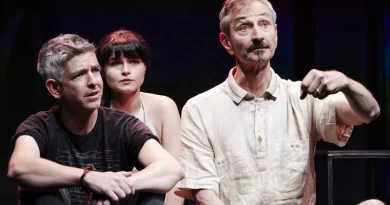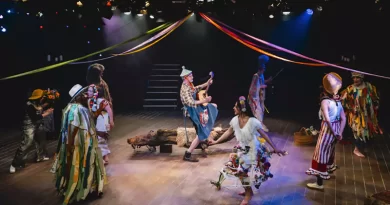“Lies Where It Falls” at Finborough Theatre
Jeremy Malies in west London
4 December 2024
This one-actor piece sees Ruairi Conaghan give his memories of appearing as “Brighton Bomber” Patrick Magee in the 2015 play The Bombing of the Grand Hotel. Conaghan recalls time spent with Magee as the play was developed, and his interaction with peace activist Jo Berry, daughter of Sir Anthony Berry, who was the MP for Enfield Southgate and a Tory whip under Margaret Thatcher when the 1984 bomb at the Grand Hotel killed him.
It happened to be Brighton that I travelled from to watch Conaghan. It’s my home town, I feel I lived a bit of this, and I expected more from a play that I see as a trite, self-conscious patchwork.
Conaghan moves from the bombing to discuss his minor role in Downton Abbey and his illness while appearing as the Player King in the 2015 production of Hamlet starring Benedict Cumberbatch. My understanding (I may have misread pre-publicity) was that a core element of the evening would be how lines in Hamlet had stirred traumatic memories of the Brighton play for Conaghan.
Unlike Hamlet, Conaghan’s text is the opposite of a revenge tragedy; forgiveness and dialogue are the underlying themes. But I never saw the writing acquire momentum, and much of the play struck me as glib theatre trivia, a kind of inside baseball talk for thesps and luvvies. There is a jibe about the ethics of theatre agents and the obligatory limp gag about Stanislavski. I was supposed to chuckle as though I was in the know, as many around me did.
Conaghan has every right to speak about “The Troubles”. I just wish he could do it with more skill as a playwright in a piece that he developed and workshopped with actor Patrick O’Kane. Conaghan’s childhood was predicated on sectarian violence; he is the nephew of (Catholic) judge Rory Conaghan who was killed in Belfast in 1974 by an IRA gunman disguised as a postman.
A projected montage of worldwide newspaper coverage of the funeral (including pictures of Ruairi’s cousin – see picture above) is one of the most affecting parts of the show. Set design (Juliette Demoulin) also features dozens of front pages covering the bombing which have been skilfully whitewashed into the back of the stage as though this may be the crumbling (white concrete and stucco) frontage of the hotel.
The Bombing of the Grand Hotel was performed in London and then at the Brighton Fringe in 2015. Later that year, Conaghan began to rehearse the part of the Player King in Hamlet under the direction of Lyndsey Turner. Shortly after the Player King arrives at Elsinore with his troupe, Hamlet asks him to reprise a scene he has performed there before. Hamlet’s request is to hear Aeneas telling Dido about how Hecuba has responded to seeing her husband murdered by Pyrrhus.
It’s certainly intriguing to hear Conaghan tell us that one morning Turner surprised the cast by asking them to sight-read a relevant scene from Marlowe’s Dido, Queen of Carthage. But even this titbit didn’t really hit my G-spot, and I guess Conaghan’s brand of recollection and bonhomie was never going to do much for me.
I saw him live in the play (a more senior reporter for this magazine wrote a review but didn’t mention him) and thanks to National Theatre at Home, I’ve just watched Conaghan do the Aeneas speech. Talk about Hamlet’s cautions against sawing the air! At one point Conaghan (who used an actor laddie declamatory style throughout) appeared to be winding up for a golf shot. Unlike Cumberbatch who was naturalistic and staggering overall, Conaghan never took flight.
And he remained earthbound for me at the Finborough in a play which does occasionally explore Patrick Magee’s mind in an interesting way. There is some great music ranging from “The Jam” to a gospel arrangement of “Oh, Happy Day” played by Conaghan on guitar. Some of the gags are decent; I chuckled at the prospect of Barack and Michelle Obama squabbling over choice of boxed set, with the president wanting an episode of The Wire and the first lady holding out for Downton. And there are moving references to other writers who have searched for their fathers in literature, the most obvious being Frank McGuinness. And Conaghan might have had Brian Friel’s Translations in mind with his quip: “If there’s one sure thing about the Brits in Ireland, it’s that they’ll always fuck it up!”
The play is bookended (unaccountably) by the Laurel and Hardy version of “The Trail of the Lonesome Pine”. There is video footage of Conaghan taking part in a New Year’s Day swim off the coast of Donegal which certainly works as a treatment of ablution after illness and frustrations. Conaghan and O’Kane show great judgement in compiling a list of innocent victims of atrocities during the Troubles from an Asian shopkeeper in Canary Wharf to a pair of brothers in Warrington and two Australian backpackers. And the piece is topical in the light of limitations as to prosecution and investigation as laid out in Boris Johnson’s Northern Ireland Legacy Act (2024).
But there is no structure to this, and it’s generally poor fayre. There is a strong temptation to pepper my review with sarcasm-laden quotations from Hamlet. They would come trippingly on the tongue, and it would be possible to be withering. Perhaps it’s best to simply say that I left the Finborough disappointed and feeling that publicity had overhyped the stature, quality, and scope of the play.









